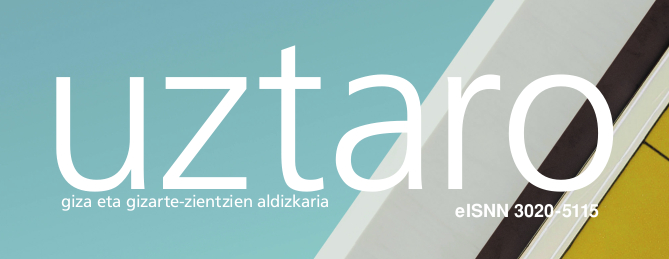Adimen Emozionala garatzeko programa: aldaketaren ebaluazio subjektiboa
DOI:
https://doi.org/10.26876/uztaro.102.2017.4Gako-hitzak:
Nerabezaroa, Sexua, Adimen emozionala, Esku-hartzeaLaburpena
Adimen emozionala bizitzako hainbat aldagai garrantzitsurekin erlazionatuta dago. Esaterako, osasunarekin eta pertsonarteko harremanen kalitatearekin. Beraz, adimen emozionala hobetzeko programak beharrezkoak izango dira pertsona osasuntsu eta zoriontsuak izaten laguntzeko. Programa horiek ebaluatzeko hainbat modu daude, besteak beste, galdetegi objektibo eta subjektiboak. Hauek izan ziren ikerlanaren helburuak: 1) Adimen emozionala garatzeko programa bat ebaluatzea nerabeen pertzepzio subjektibotik; eta 2) aztertzea ea programak modu bereizgarrian eragin zuen sexuaren arabera. 13-16 urte bitarteko 148 nerabek osatu zuten lagina. Postest diseinu kuasiesperimental bat erabili zen ikerketan kontrol-taldeekin. Eskuhartzeak 20 saio izan zituen, astean ordubetekoak. Horren helburu nagusia nerabeen adimen emozionala hobetzea izan zen; zehazki, autokontzientzia, erregulazio emozionala, gogo-aldartea, komunikazioa eta enpatia. Esku-hartzearen ondoren, Programa Ebaluatzeko Galdetegia (PEG) banatu zen, adimen emozionala neurtzeko tresna subjektibo bat. Emaitzek agerian utzi zuten parte-hartzaile esperimentalek aldaketa handiagoa hauteman zutela. Esku-hartzeak antzeko eragina izan zuen bi sexuengan.
Deskargak
Lizentzia
Copyright (c) 2017 Uztaro

This work is licensed under a Creative Commons Attribution-NonCommercial-ShareAlike 4.0 International License.




















